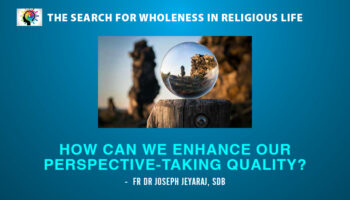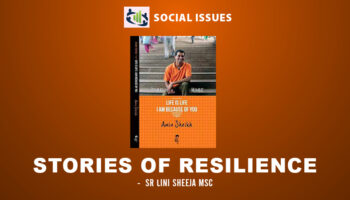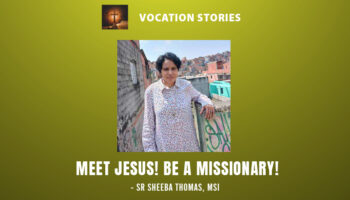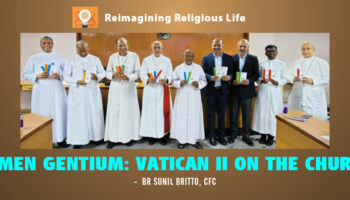15 points for personal and community reflection
(For religious, priests, seminarians and other committed Christians)
We have all heard—and these weeks we shall hear more—good and edifying things about Mother Teresa. Shall we check how far we personally and our community live by the Gospel ideals she took to heart so radically?
1. Religious and Missionary Call. As a young woman, Agnes Gonxha Bojaxhiu responded to God’s call by joining a missionary order, taking the name of Teresa, and went to serve in far-off India.
Am I ready to serve wherever the need is greatest—or do I stick to familiar settings, or, worse, use religious life and priesthood as a career rather than as a mission?
2. “Call within a Call”: At the age of 37, Sister Teresa hears this new call—to leave the convent and live among the poorest. She seeks spiritual direction and guidance in discerning God’s will. Her priority is to do what God asks, not what others think, or simply go on doing what she was doing.
Am I simply staying and growing older in religious life (priesthood), or do I take my own personal call (to holiness and mission) seriously? What is the good God wants from me, with the gifts and opportunities He has given me?
3. Security or trust? When dead tired after a day in the slum, and without even enough money for a tram fare, she felt the “real temptation was to go back to Loretto.” (And the sisters would have taken her back). But she stuck to the harder path, without money, without helpers, without knowing what the future held.
Do I have this type of trust in God? Or do I put my trust more in money, security, connections and a comfortable life?
4. Start with those near you: Mother Teresa did not start with some grandiose plan, but with helping the neediest person near her, e.g., caring for a terribly ill Hindu pujari. She was convinced that God met her in the poorest and neediest persons around her.
Do I (we) really reach out to the neediest persons around us, or lose ourselves in endless discussions? Is my life expressed in loving service, or have I let my love wither and die?
5. Vocations: Mother Teresa did not go on aggressive “vocation promotion” campaigns. Her example drew committed followers to her, beginning with some of her former students.
Are our candidates joining because they are inspired by our example, or under the influence of high-pressure “vocation promotion” methods? Are the younger members inspired by the life of the older members?
6. Good people everywhere: Help came to Mother Teresa from all sorts of unexpected and unusual quarters: British TV personality Malcom Muggeridge; people in the Indian government; Navin Chawla, former election commissioner, who wrote a moving book about her; so many people of various faiths who helped her financially…
Is my heart open to people of all backgrounds, trusting that God can act in and through anyone? Or am I biased against persons of other faiths or backgrounds?
7. Concrete and practical: Mother Teresa would give simple, practical advice rooted in daily life: Want to build world peace? Start by loving your family members. “Peace starts with a smile.” Spend time in prayer to listen to God.
Is my spirituality simple and practical, making a difference to my life? Or made up of big theories with little connection to daily life?
8. Dark Night: Mother Teresa endured nearly fifty years of dryness in prayer (What the mystics call, the “Dark Night of the Soul”), yet she persevered in prayer and in good works, without fail. She trusted in God and sought His will, even when she experienced God as absent. And she sought help in spiritual direction.
Am I faithful to prayer and my commitments, even when I have no feeling for it? Do I seek spiritual direction when I feel rudderless or lost, rather than neglect my inner life?
9. A pencil: During years of ill health, Mother Teresa was not anxious about herself or about the future of her work. She saw herself as a “pencil in the hand of God.” God’s work would continue, whether she was there or not. (This is a mark of all saintly founders.)
Do I look to the future with trust in God, or with anxiety? Is my main concern doing God’s will and seeking God’s guidance, or getting others to do what I want? Do I see our mission as God’s work or as my work?
10. Facing criticism: Mother Teresa was severely criticized by some well-known writers and media persons—for not challenging unjust structures, for accepting money from unsavoury characters, for not providing up-to-date medical care in her homes, etc. She did not become bitter, or try to defend herself. Nor did she stop doing what she was doing because of the criticism.
How I deal with criticism shows a lot about my character and my faith. Do I learn from criticism, and improve, and do the good I can? Or do I stop doing good out of fear of criticism?
11. Learning from the poor: Mother Teresa said she learnt much from the poor. She saw them not as objects of pity, but as persons she loved. She mentioned how the poor help us to get closer to God. She cared; she was not patronizing.
Do I really love the poor I come across and deal with, or keep my distance? Do I only talk about the poor, or really relate to concrete poor persons?
12. A life of poverty: Mother Teresa was certainly one of the most famous persons of the twentieth century, and probably the most venerated human being in the world. But she did not seek acclaim, or the company of the powerful. She remained poor and simple, and close to the poorest. She lived the life of poverty of the poor people she served.
As we advance in our responsibilities and become “more important,” do we remain simple and poor in our life-style and relationships? Or do positions and titles go to our head?
13. Convinced and courageous: Mother Teresa was comfortable with the poorest leprosy patient and courageous to express her difference of opinion with the mighty. She would speak up for the poor in front of the world’s mightiest leaders, or express boldly her staunch rejection of abortion.
Is this how we behave—with the same respect and dignity before rich and poor, weak and strong? Or do we cringe before the powerful and humiliate the poor? Do we speak up when we need to?
14. Indian at heart: Mother Teresa took India into her heart. She did not speak of inculturation; she lived it. Beginning with her decision to wear the simple cotton sari of poor Indian women (something which foreign missionaries did not do then), eating what the poor ate, speaking their language, she truly was Indian at heart.
Do I truly love and respect the poor I work for, including their culture and values? Or do I remain an “outsider” who looks on the local people with suspicion or contempt?
15. Joy: Mother Teresa radiated joy. She was vibrant and full of life. She not only spoke of the importance of a smile; she herself was a warm and joyful presence. She insisted that God loves cheerful givers.
Do I radiate joy? Will people who meet me go away happier? Are our communities happy? Are we living witnesses to the joy that God brings us?
To subscribe to the magazine Contact Us





